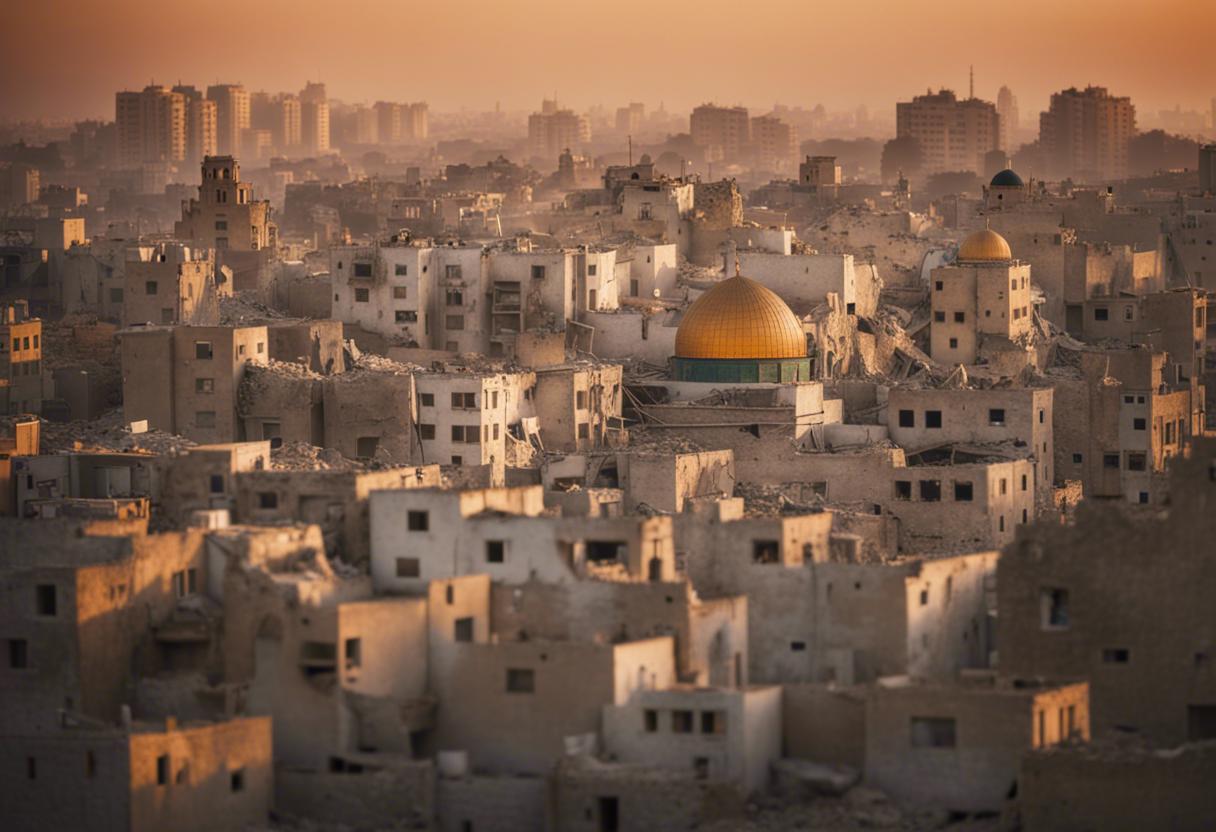Gaza City inhabitants were confined in their homes while corpses remained in the streets, uncollected due to a renewed harsh Israeli onslaught. Meanwhile, in Egypt and Qatar, efforts for a peace treaty were underway, guided by Washington. However, due to a severe Israeli onslaught on Gaza City this week, Hamas has expressed concerns that this could jeopardise any attempts to distil peace, particularly as the dialogue has reached an advanced stage. The Palestinian Islamist extremist group commented that they still await feedback on the progress of the discussions since they made some compromises as a reaction to the US-supported Israeli peace overture last week.
The office of Prime Minister Binyamin Netanyahu reported that the head of Israel’s Shin Bet security agency was travelling to Cairo for further talks about ceasefire. US representative Brett McGurk was in Israel and had meetings with the defence minister, Yoav Gallant.
People from Gaza City compare the assault of this week to the most brutal battle of the conflict which occurred last year when the first settlement of Gaza, the oldest and largest, was destroyed in the initial weeks of the conflict.
Prior to the warfare, Gaza City was home to over 25% of Gaza’s population. Although it was significantly demolished in the later stages of 2023, hundred of thousands of Palestinians have since returned and settled among the remnants. Despite being commanded by the Israeli military to vacate the city once more, many Palestinians remain staunch in their decision to stay.
“We will resist leaving to the southern region, even if it means death. After enduring hunger and bombings for nine months, we’re all set to sacrifice our lives here,” proclaimed Mohammad Ali, a 30-year-old resident, through a text communication. Despite suffering from a shortage of food, water and medical supplies, Mr. Ali and his family, who have relocated several times inside the city, are hopeful for an imminent ceasefire. However, if the situation doesn’t improve, he expressed his readiness to accept it as God’s will.
Describing the city’s current situation, another resident, Hatem Tayeh said, “All you see is ruin. Nothing spared, not even the trees. This area was once richly green. What sin have stones and trees committed?”
Reports have emerged from the Gaza health ministry, under Hamas control, claiming people are killed and trapped inside their homes in the Tel Al Hawa and Sabra neighbourhoods of Gaza City, with rescuers unable to gain access. This follows an assessment by the Civil Emergency Service of a minimum of 30 casualties in the Tel Al-Hawa and Rimal districts, noting that body recovery from the streets wasn’t feasible.
Despite the Israeli army instructing residents of Gaza City to head towards the south via two designated “safe routes” on Wednesday, some locals refused to evacuate, making their stance known on social media with the hashtag “We are not leaving”.
Eastwards, in the Shejaia suburb of Gaza City, citizens are cautiously navigating on foot through a landscape of ruins left behind by the Israeli military’s two-week-long campaign. Israel’s forces had extensively damaged even the main cemetery. Supplies are being transported across debris-filled paths, past scorched and shattered remnants of Israeli armour.
Hatem Tayeh, a Shejaia resident, stated upon his return after a fortnight, “We came back to Shejaia to find total devastation. Not a single tree was spared in this previously lush area. As an innocent civilian, what is my crime? And how did rocks and trees transgress?”
Israel initiated this attack on Gaza last year in response to a deadly incursion by Hamas-backed militants into southern Israel that resulted in the death of 1,200 individuals and over 250 individuals captured, as per Israeli estimates. Israel’s actions have reportedly led to more than 38,000 deaths, as per Gaza’s medical community.
Meanwhile, in the city of Rafah at Gaza’s southern tip, near the Egyptian border, locals report continued demolition of residences by the army across the western and central areas amid conflict with militants from Hamas, Islamic Jihad and other factions. Palestinian health authorities reported four deaths, including a child, in a recent air strike by Israel in the Tel Al-Sultan locality of western Rafah.
Earlier on Thursday, the Israeli military confirmed the successful interception of about five rockets fired from the Rafah region.
Key talks have taken place in Qatar and Egypt following notable compromises by Hamas last week. The group agreed that a ceasefire could start and some captives could be set free before Israel committing to cease the war. However, on Thursday, Hamas issued a statement accusing Israel of utilising tactics of delay in order to sabotage the current discussions, mirroring past failed negotiations, the likes of which included a week-long ceasefire in November.
Israeli Prime Minister, Mr Netanyahu, who is encountering resistance from his conservative cabinet regarding any resolution that doesn’t result in a Hamas defeat, insists that any agreement must permit Israel to recommence conflict until all its goals are met. Israel’s Ministry of Defence reported that a meeting between Mr Gallant and US envoy Mr McGurk had talked about the developments made in dialogue about an accord for releasing captives, emphasising on necessary security protocols to prohibit the smuggling of arms into Gaza. – Reuters.

